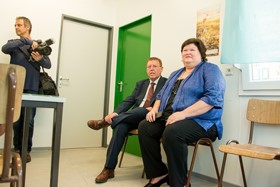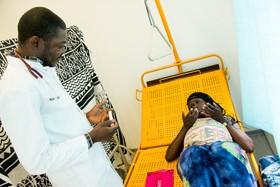
Minister of Social Affairs and Public Health Maggie De Block, the President of the Chamber Siegfried Bracke and members of the All-Party Parliamentary Group ‘Parliamentarians for the 2030 Agenda’ visited the one-day African family planning clinic that opened its doors in the heart of the federal parliament. The pop-up clinic called attention for the 225 million women in the South who would like to prevent or postpone pregnancy, but lack access to contraception.

The Minister and MPs were touched by the stories of the African women consulting the clinic. They got to know Isha Isha, a 15 year old girl in her fifth month of pregnancy. She was sent to the clinic by her mum, who lost two of her other daughters during their deliveries. With her father’s passing, Isha Isha had married one of his old friends, to help out the family.
The MPs felt Coumba’s frustration. An ambitious young woman, Coumba set up a business with her peers. She came to the clinic to have an IUD installed. Children, yes, one day, but not now, so she explained. But Coumba had to leave the clinic empty-handed. Stock-outs, so she was told. Abstinence, the advice she received.
Maybe the most touching story was Hope’s. A pregnant mum of two who was having an HIV-test. Hope didn’t understand. How could she be HIV-positive? She’d been faithful all along. The doctor told her to come back. Her youngest boy needed to be tested too.
The stories of these African women were made-up. They were played by professional actors based on real life stories. They show how access to contraception remains a major challenge for so many women. 225 million women in the South would like to prevent or postpone pregnancy, but can’t.
Because of the unmet need for family planning, many women get pregnant at an early age or end up having successive pregnancies, with little or no time in-between. This puts their health and lives at risk, as well as their children’s. If this unmet need were met it is estimated 150,000 women’s lives a year could be saved, the death of 590,000 newborns could be prevented and half a million children would not lose their mother.
Belgian politicians understood that the international community needs to step up its efforts to help achieve the 2030 target of universal access to sexual and reproductive health.
The MPs felt Coumba’s frustration. An ambitious young woman, Coumba set up a business with her peers. She came to the clinic to have an IUD installed. Children, yes, one day, but not now, so she explained. But Coumba had to leave the clinic empty-handed. Stock-outs, so she was told. Abstinence, the advice she received.
Maybe the most touching story was Hope’s. A pregnant mum of two who was having an HIV-test. Hope didn’t understand. How could she be HIV-positive? She’d been faithful all along. The doctor told her to come back. Her youngest boy needed to be tested too.
The stories of these African women were made-up. They were played by professional actors based on real life stories. They show how access to contraception remains a major challenge for so many women. 225 million women in the South would like to prevent or postpone pregnancy, but can’t.
Because of the unmet need for family planning, many women get pregnant at an early age or end up having successive pregnancies, with little or no time in-between. This puts their health and lives at risk, as well as their children’s. If this unmet need were met it is estimated 150,000 women’s lives a year could be saved, the death of 590,000 newborns could be prevented and half a million children would not lose their mother.
Belgian politicians understood that the international community needs to step up its efforts to help achieve the 2030 target of universal access to sexual and reproductive health.

 RSS Feed
RSS Feed